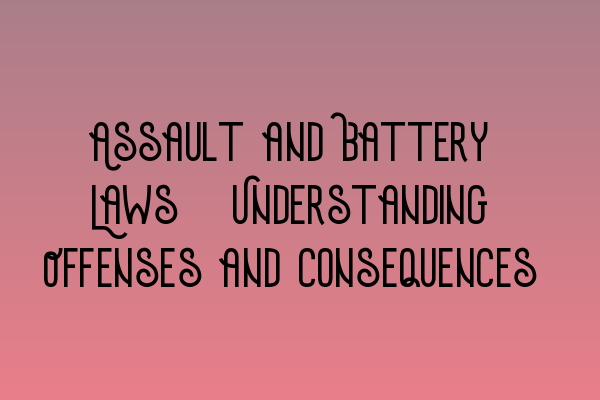Assault and Battery Laws: Understanding Offenses and Consequences
Introduction
Assault and battery are common terms you may have heard of regarding criminal offenses. These acts can have serious legal consequences and it’s essential to understand their definitions, distinctions, and potential repercussions.
At SQE Criminal Law & Practice Law UK, we aim to provide comprehensive information on legal subjects to help individuals gain a better understanding of the law. In this article, we will discuss assault and battery laws in the UK, the differences between the two offenses, and the possible outcomes one may face for committing these acts.
Assault
Assault refers to the intentional act of causing someone to apprehend immediate and unlawful violence. It involves making the victim fear for their safety. Physical contact is not necessary for an assault to occur.
There are different forms of assault, including:
- Simple Assault: It involves making someone fear immediate violence.
- Aggravated Assault: This is a more serious form of assault that involves using a weapon or causing severe bodily harm.
Consequences: Depending on the severity and circumstances of the assault, the offender may face criminal charges, fines, or imprisonment. To learn more about the legal penalties for assault, check out our SQE 1 Practice Mocks FLK1 FLK2 article.
Battery
Battery, on the other hand, involves the intentional and unlawful touching of another individual without their consent. Physical contact is crucial for a battery offense to occur.
Similar to assault, there are different forms of battery, including:
- Simple Battery: It involves non-consensual physical contact that may or may not cause harm.
- Aggravated Battery: This is a more severe form of battery that typically involves causing significant bodily injury or using a deadly weapon.
Consequences: The legal consequences for battery can vary depending on the severity of the offense and the jurisdiction. To better understand the potential outcomes for committing battery, take a look at our SQE 2 Preparation Courses article.
Difference Between Assault and Battery
While assault and battery are often used together, there is a clear distinction between the two:
- Assault: Refers to the act of causing someone to fear immediate violence.
- Battery: Involves the intentional and non-consensual physical contact with another person.
An important thing to note is that assault can lead to battery if physical contact occurs. However, assault charges can still be brought without any physical contact.
Legal Consequences
The legal consequences for assault and battery offenses can vary depending on the jurisdiction and the severity of the acts. In general, the potential consequences may include:
- Fines
- Probation
- Custodial sentences, including imprisonment
- Community service
If you want to know more about the potential legal consequences of assault and battery offenses, consult our SQE 1 Preparation Courses article.
